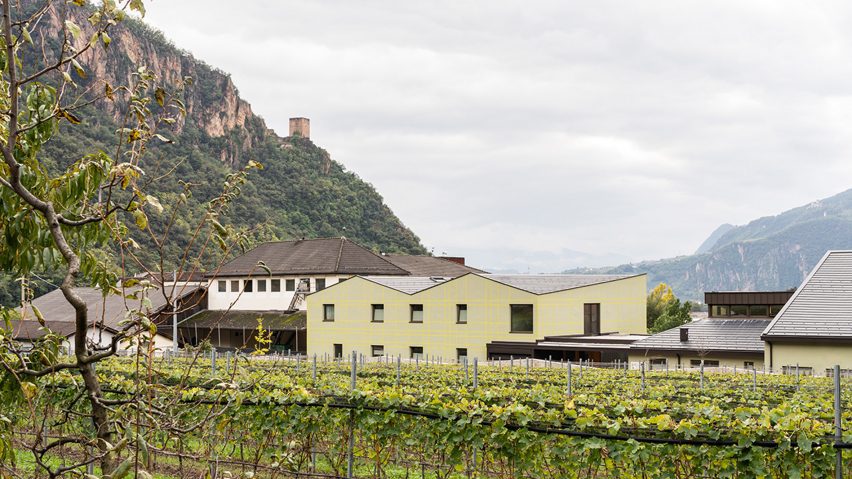Architecture studio MoDus Architects has extended a daycare in the town of Terlano, Italy, to create the Tartan School nursery, kindergarten and youth centre.
The small South Tyrolean town is surrounded by orchards and vineyards, which the studio used to inform the nursery's appearance.
"The school derives its name from the plaster facade of the building, which emulates the patterning of tartan fabric – a textile that conveys a feeling of warmth and familiarity," said MoDus Architects co-founder Sandy Attia.
"The combined use of colour and texture is a cost-effective strategy that is able to camouflage and build character at the same time, despite the seemingly divergent definitions of the two words," added the studio.
The extension has a two-tone, green tartan patterned facade and zigzagging roof, which distinguishes it from the traditional, existing building and surrounding town.
It contains a kindergarten for 100 children with four classrooms along with group activity rooms, a napping room, reading area and common areas.
The studio aimed to connect the lower level of the extension, which will be used by the wider community for events and meetings, to the outdoor spaces.
A colonnade filled with glass walls and doors runs alongside the dining hall visually connecting it to the schoolyard.
Alongside the dinning hall, other spaces that will be used by the community include a 50-person-capacity auditorium and a gym.
"In Italy, there is a long-standing tradition of the school being a place used for all sorts of activities outside of school hours," said MoDus Architects.
"We think of schools like puzzles, although ideally, every piece has to fit in place, if a few of those puzzle pieces go missing with time, the big picture needs to still be legible."
Alongside the extension, the rearranged existing structure now contains a nursey school on the upper floor level and a youth centre on the lower level.
MoDus Architects aimed to unite the two structures with the internal finishes, including red-brick resin flooring, wooden ceilings and MDF furniture. Acoustic panels were used for ceilings to reduce the noise caused by its numerous young users.
Founded in 2000 by Sandy Attia and Matteo Scagnol, MoDus Architects is based in the northern Italian town of Brixen.
Its previous projects include the refurbishment of a 1960s education centre and a sports centre topped with a tapering tower.
The photography is by Marco Cappelletti.

